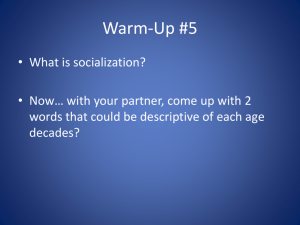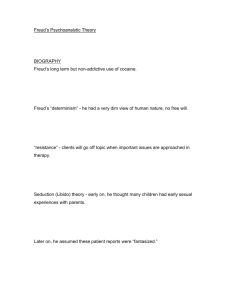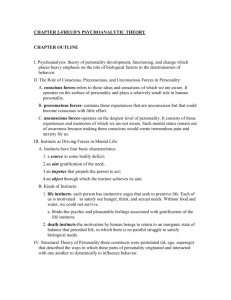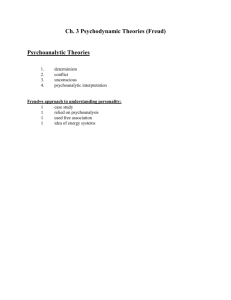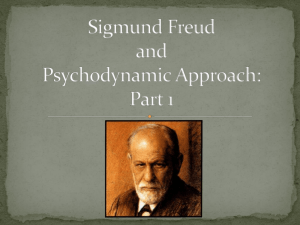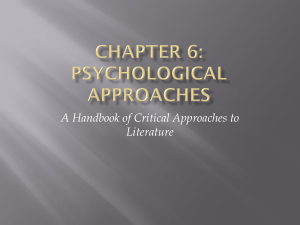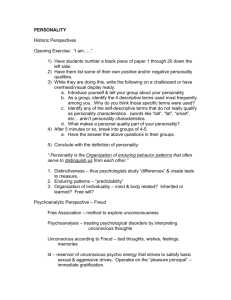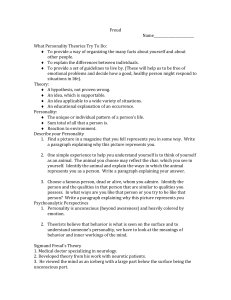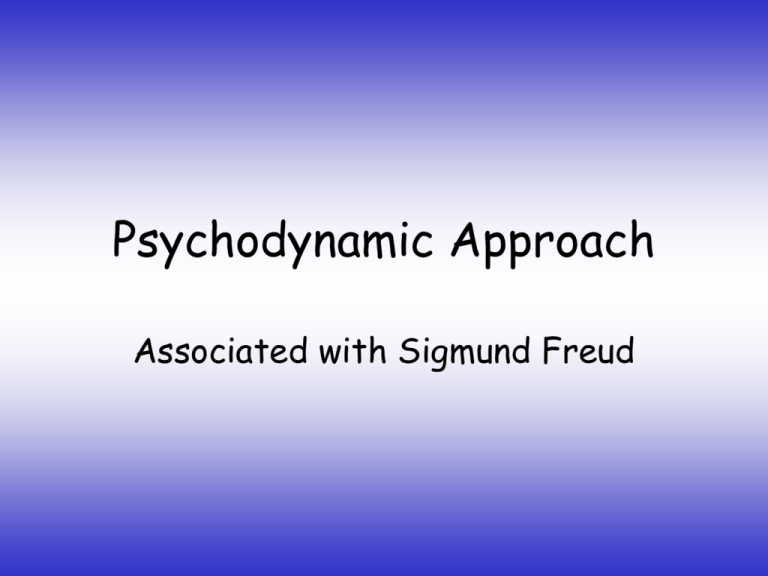
Psychodynamic Approach
Associated with Sigmund Freud
Why Freud is important….
• Saw the
importance of sex
• Saw the
importance of
childhood
• Created the first
talking therapy
Sigmund Freud….associated with
•
•
•
•
Unconscious Mind
Freudian Slips
Dreams
Psychological defence
mechanisms
• The structure of
personality
• Psychosexual
development
Can you identify a key
assumption of
• The Cognitive
approach
• The social approach
One Key assumption of the
psychodynamic approach
That a large part of the
mind is ‘unconscious’
but it can affect our
feelings, thoughts and
behaviour
Factors that motivate behaviour.
.
Pre-conscious:
• Contains thoughts that can become
conscious to us.
• Thoughts arising from the
unconscious that may at a later stage
become conscious are stored here.
Consciousness:
• The Conscious State: Means all the
mental processes that we are directly
aware of at a given moment.
• Thoughts that are suitable for us to
be aware of pass from the
unconscious to the conscience mind.
Unconscious:
• This part of the mind is NOT accessible and
contains our inner drives and repressed
experiences.
• All thoughts start here
• Biological instincts originate from here
including unacceptable sexual thoughts.
• It contains the Eros and Thanatos instincts
including the Libido which can manifests into
the sex drive.
• Thoughts that do not go into the pre-conscious
must be actively repressed- this is a dynamic
process, although we are unaware of it
happening.
Unconscious:
• Has no logic and makes no distinctions
between reality and fantasy (carrying out
sexual desires).
• Unconscious thoughts try to actively get
though to or consciousness.
• Can use symbols such as in dreams.
• Can hold two conflicting thoughts at the
same time- eg. Feeling love and hate .
• Influences behaviour in logical ways- or so
Freud though- eg Freudian slips.
Revealing inner thoughts:
• Actively repressing inner thought
takes up energy (psychic energy
originates in the unconscious)
• Thought are sublimated i.e.
channelled into other forms
– Freudian slips. Parapraxes
– Dreams
– Neurotic symptoms.
Freudian slips
• Things in our unconscious mind trying to slip into
our consciousness, we substitute words for an
indented one: eg:
– Organism or orgasm
– Love or hate
• However has been criticised- do all mistakes have
relevance to inner emotions?
See U tube clip ~
Top ten Freudian slips on TV
http://www.youtube.com/watch?v=BEIslG2McpA
Psychodynamic theory
is massive so read
around this subject!
Starting point is Brain
pages 160 – 226
Specifically 185-190
Specific reading
Brain
End of lesson 1
What can you remember about
the first assumptions of the
psychodynamic approach?
The 2nd Main assumption is the
Structural model of the
Personality:
• ID: primitive part, contains energy to fulfil our
instincts. e.g. Sexual and aggressive drives.
Pleasure Principle. Defends conscious against
displeasure.
• EGO: Contacts with the external world. Functions
to satisfy ID’s needs. Reality Principle.
• SUPEREGO: Contains the ego-ideal which is a set
of moral standards, it is the conscience which
punishes bad behaviours and leads to guilt and
anxiety
Id
Super Ego
Ego
Personality
Can you think of any experiences where
this has happened to you?!
Conscious
Preconscious
Unconscious
STOP – personality
task
Application to an exam question
• Look at the exam question…. The second
one requires you to have an example
• Ensure you have some examples in your
notes to relate this theory too
Defence mechanisms
• The ego uses defence mechanisms when
threatened by pressure from the Id and
Superego.
Defence Mechanisms:
• Protect us from mentally disturbing,
harmful thoughts- memories- experiences.
• Unconscious mind holds onto harmful
thoughts by using defence mechanisms
such as repression.
• These thoughts may stem form earlier life,
such as abuse, or unresolved Oedipus
complex and can effect us in later life.
Help!! Stressed Ego!
Intellectualise or
Rationalise It
Repress It
Displace It
Defence
Mechanisms
Deny It
Project It
Defence mechanisms
•
•
•
•
•
•
•
Regression
Sublimation
Displacement
Repression
Denial
Reaction formation
Projection
https://www.youtube.com/watch?v=
e-NP__ExSSE&feature=related
~ Complete cut n stick….
Is there any evidence
for Defence
Mechanisms?
Penile Plethysmograph
Adams et al 1996: Reaction
Formation
• Reaction Formation means adopting a
view that is the direct opposite of true
feelings.
• Studied homophobic men watching gay
porn.
• Measured aggression levels and sexual
arousal using questionnaire, self reports
and physiological measures (Penile
Plethysmograph)
Results Adams et al 1996.
• No difference in
aggression.
• No difference when
viewing lesbians or
heterosexual scenes.
• BUT
• 80% homophobic men
were aroused when
viewing gay scenescompared to only 33%
non-homophobic men.
• Evidence for defence
mechanism against being
gay.
Link to spec…
Describe defence mechanisms including
repression and one other:
–
–
–
–
Displacement
Denial
Projection
Regression
3rd important assumption
• The first 5 years of life are important to
personality development
• All children pass through the same 5 stages,
if issues remain unresolved in any of these
stages it can lead to later personality
problems
• Libido is sexual energy an instinctive
energy. We are born with innate drives.
5 Psychosexual Stages
• Freud said all children go through these stages
of development.
• The order cannot be changed
• At each stage the libido (inborn energy) is
concentrated in different parts of the body.
• The child is driven to satisfy the libido since
satisfaction gives pleasure.
• What happens during these stages affects the
adult personality.
Psychosexual stages
• We are all hedonisticthat is we are driven
to satisfy the
instinctual demands of
the ID
• Sources of pleasure
are determined by the
libido (life force)
• As a child moves
through different
stages of development
(psychosexual stages)
the sources of
pleasure change
Psychosexual Development:
Instinctual drives:
• Oral Stage
• Latency stage
• Anal Stage
• Genital stage
• Phallic Stage
(Oedipus and
Electra complex)
The Psychosexual Stages
•
•
•
•
•
1. The Oral stage –birth to about 18months
2. The Anal Stage 18 months-3years
3. The Phallic Stage 3-5 years
4. Latency 5years-puberty
5. Genital stage puberty onwards.
Psychosexual Stages
Oral
The mouth –
sucking,
swallowing etc.
Anal
The anus –
withholding or
expelling faeces
Phallic
The penis or
clitoris masturbation
Latent
Little or no sexual
motivation present
Genital
The penis or
vagina – sexual
intercourse
EGO develops
SUPEREGO develops
Stages:
• Each stage at a different time in
development and is related to
gratification of the ID form a
different pleasure source.
• Driven by Instinctual drives:
– Thantos: death instinct, aggressive
drives.
– Eros: life instinct, sex drive/libido.
Fixation
Forceful feeding
Oral
Deprivation
Early weaning
Toilet training:
Anal
Phallic
Oral activities (e.g.
smoking),
dependency,
aggression.
Too lax
Obsessiveness,
tidiness, meanness; untidiness,
generosity
Abnormal family
set-up leading to
unusual
relationship with
mother/father
Vanity, selfobsession, sexual
anxiety ,
inadequacy,
inferiority, envy
Too harsh
http://www.youtube.com/watch?v=cvOoYX45G_0&feature=related Freud’s psychosexual stages
http://www.youtube.com/watch?v=e-NP__ExSSE&feature=related -defence mechanisms
Electra and Oedipus
Development of Sex and Gender and
Morals
• A child’s sense of gender was said to develop
during the Phallic stage of psychosexual
development.
• Boys go through the Oedipus complex
• Girls go through the Electra complex.
• By the end of this stage children should know
their sex and gender, and begin development of a
conscience.
Oedipus Complex:
• BOYS:
–
–
–
–
–
Awareness of penis.
Attracted to mother- sexual.
Competes with father for affection.
Resents father and wishes him dead.
Fears father as if he finds out might cut off
his penis- Castration Complex.
– Resolved by identifying with father, represses
love for mother.
Electra Complex:
• GIRLS:
–
–
–
–
Notices no penis, believed already castrated.
Turns to father as suffers Penis Envy.
Blames mother for castration so fears mother.
Fear of losing mother and symbolic gains of
imitating mother (who father is attached to)
represses love for father and identifies with
mother. (Stop)
The Oedipus Complex
Father
3. Son becomes
jealous, scared of
Father.
Begins to feel
guilt
2. Son notices
FatherMother
Sexual
relationship
Son desires
Mother
Mother
Son
1. Mother –Baby relationship
Resolution of the Complex
• Son realises that he cannot beat Father
• Instead he lessens his identification with
the Mother and identifies with father.
• Through this he learns male behaviour, so
that when he matures he can gain a female
of his own.
• If this stage is not satisfied this could lead
to…
STOP – video to bring it all together…
Homework task
Go to the following website and
complete the personality test
which is based on Freudian
principles.
Do you agree with what it says?
http://similarminds.com/freud.
html
Recap
• The Human Mind has three levels of
consciousness. (Iceberg)
• The adult personality has three main
parts.(Tripartite)
• All humans go through five ‘Psychosexual Stages’
of development. What happens in these stages can
be seen in the adult personality.
The Adult Personality-Three Main Parts
Superego
Adult
Ego
Child
Id
Baby
These parts interact dynamically

